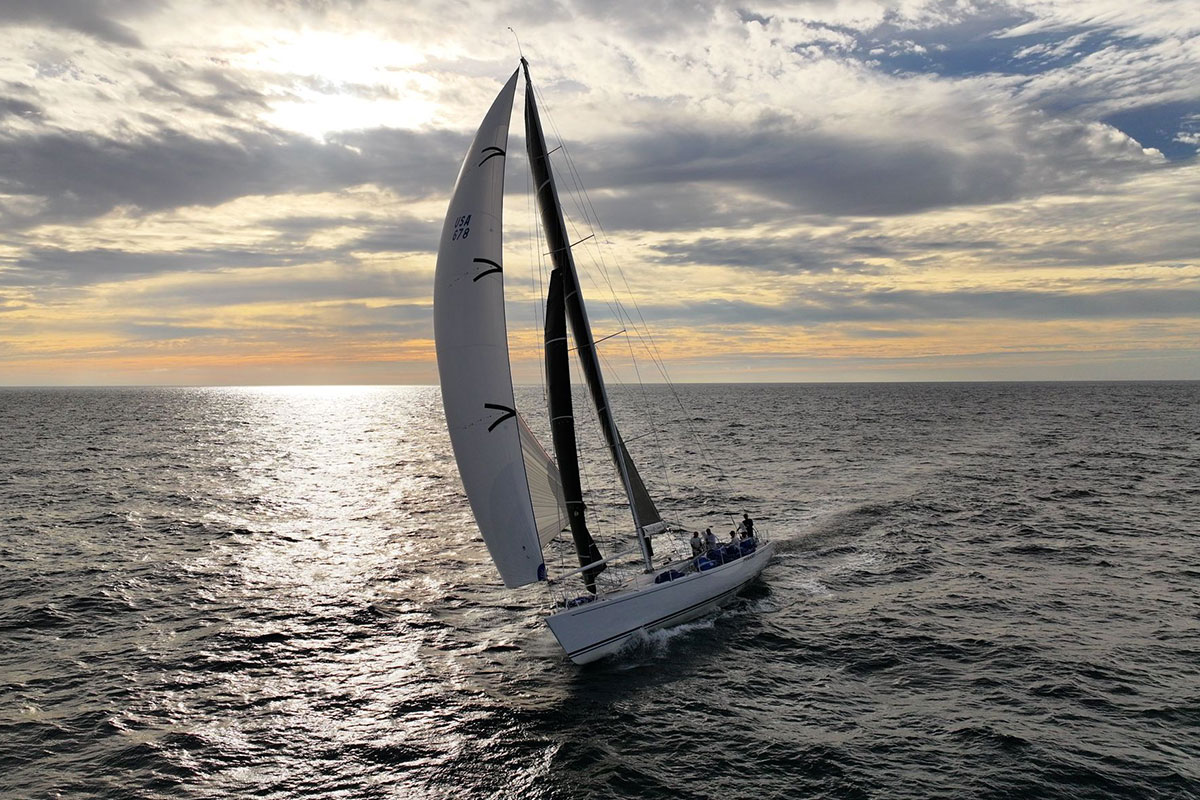A lot of sailors would suggest that it’s ‘when’ you start that matters, the earlier the better. Others would insist that it’s the weather on your start day that matters most, the windier the better. Both are logical and have been true separately and combined. But what if NEITHER mattered?
Not many (any?) spectators on Shelter Island watching the Saturday starters for the the 2024 San Diego to Puerto Vallarta International Yacht Race would have speculated that seven of the boats floating in the windless bay that afternoon would fill the top seven overall finishing positions! They were already 48 hours behind the two Thursday starters blasting down the course in a fresh westerly wind. But after a week of many sail changes, cursing grib files, running weather models, and pressing the boat when the ‘park up’ (sitting ‘parked’ in becalmed windless conditions) was over, that is exactly what the results reflect.
One answer is that larger boats with larger sail areas have more access to the wind when it is light, thus have a better chance of sailing faster relative to the smaller boats. To frame it another way - you don’t really have to sail 20+ knots to win. You just have to sail 1-3 kts faster than your competitors as often as possible. Sailing at 5-7 kts when your competitor is sailing 0-2 kts will get it done!
With that idea, you can conceive why this year was a big boat year, featuring perennial performer Roy P. Disney’s Andrews 68 Pyewacket, at the top of the fleet followed by RP 52 Vitesse, RP 51 Zero Gravity 51, D/K 68 Peligroso, and the Bakewell White 100 Rio100 to round out the top 5.
Still, looking back, the 2020 Puerto Vallarta race showcased a sled-killer Hobie 33 Sizzle helmed by World Champion Bill Hardesty linking the evening thermals all along the Baja beaches while his larger competitors were parked up further out to sea for an overall win. There is always hope for the smaller boats that start early!
Here’s how the 2024 PV Race came together.
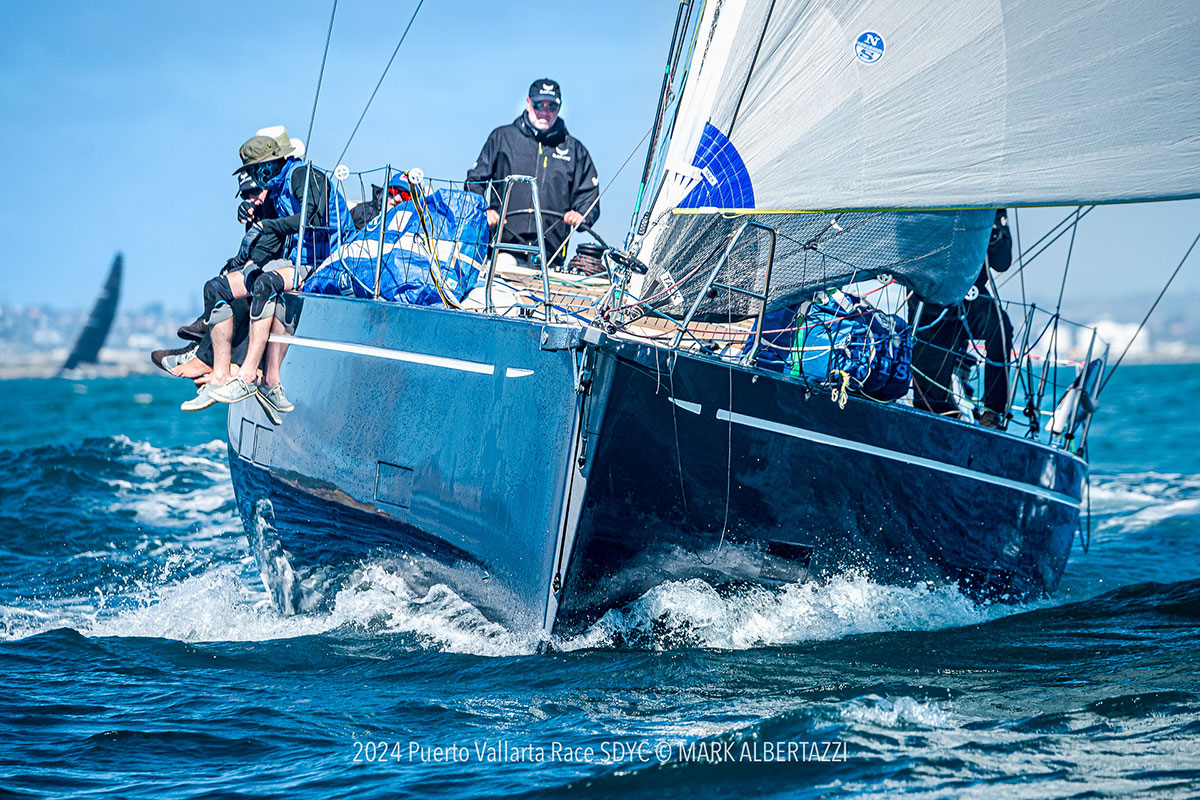
CLASS 6 || Blackwing, Barry Clark
Barry Clark’s Grand Soliel 44 Blackwing lost their internet connection early on in the race, and had the unique position of sailing at the front of the fleet from Thursday thru the weekend to Tuesday (aside from Rio100’s passing) without the ability to find their competition on the course until each day’s 0800 report. But there’s something to be said for having an open slate on the race course to make unbiased decisions and sail the race your way, as they cruised to a Class 6 victory.
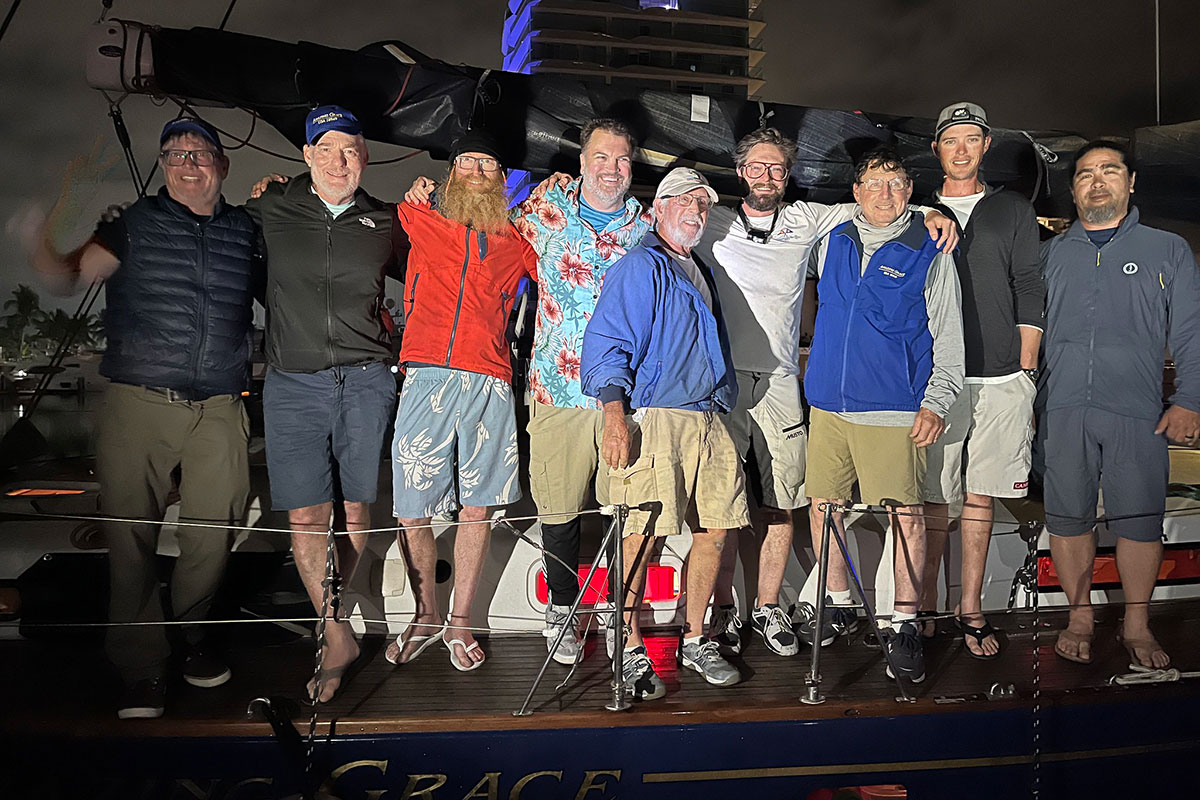
CLASS 5 || Amazing Grace, Jim Puckett
Class 5 had different leaders throughout the week of racing in 2024, and ended with Jim Puckett’s Farr 57 Amazing Grace sailing away from the Class 5 competition on the southernmost route around the Baja Peninsula and into the finish.
Jim Puckett, 24 hours prior to finish: “It's been a great race so far, despite challenging and sometimes frustrating light-air conditions during the early part of the race. The last few days have provided a great reminder of why we do this. Blasting downwind in 20 knots under full sail, seeing these stunning sunsets and moon rises, power-reaching across the Sea of Cortez, we are having an Amazing time on Amazing Grace.
We took a bit of a gamble going well south of the cape, but the low track we've chosen just might be paying off. The crew has been working very hard doing lots of sail changes, mostly at night it seems (isn't that always the way) and stacking every single sail on the boat on the windward rail for the final reach to the finish line. Regardless of where we end up on the leaderboard, we will have given it our very best effort. And we are having a blast.”
After the finish when Amazing Grace had determined they had won their class, the team was thrilled that their decisions on their last 24 hours had paid off. The gamble was to sail south prior to the approach to Cabo, in fact the most southern route across the Sea of Cortez in the entire fleet this year, to see if they could avoid the wind hole that loomed ahead. The initial standings check had dropped them to 4th in class and seemed like the mistake would cost them all their prior gains. But over the next 36 hours they quickly saw their competition’s speed dropping while their own line to the finish remained consistently strong. Their winning tactical gamble was uniquely satisfying.
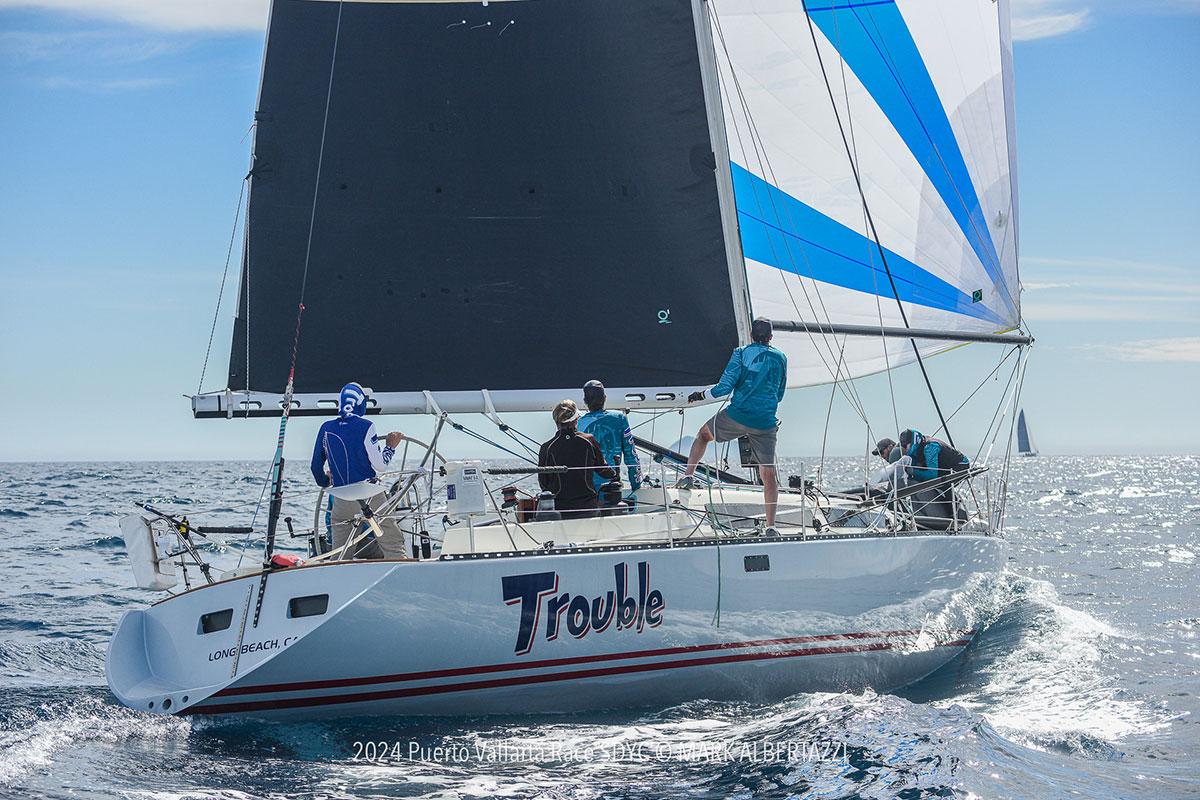
CLASS 4 || Trouble, Tom Camp
Class 4 saw the closest race from start to finish where Tom Camp’s Santa Cruz 50 Trouble posted a narrow 3 minute corrected time win over Dave Moore’s Santa Cruz 52 Westerly. Thursday afternoon, Westerly had finished and arrived at the dock awaiting word on whether Trouble would be able to overtake their time. As the minutes ticked away, Trouble sailed the last few miles in nice steady Thursday afternoon winds generating boat speeds consistently 7+ knots that allowed them to eclipse Westerly’s time.
Tom Camp, Trouble: "Light conditions favored us for much of the race. We went wide around Cabo for a more southern track, allowing us to take advantage of the variable conditions on the approach the finish. The final morning, however, we sailed into a hole that virtually stopped us. The key for us was an exceptionally well-prepared boat and a great crew that refused to give up and gave their all to get across the finish just in time for the win."
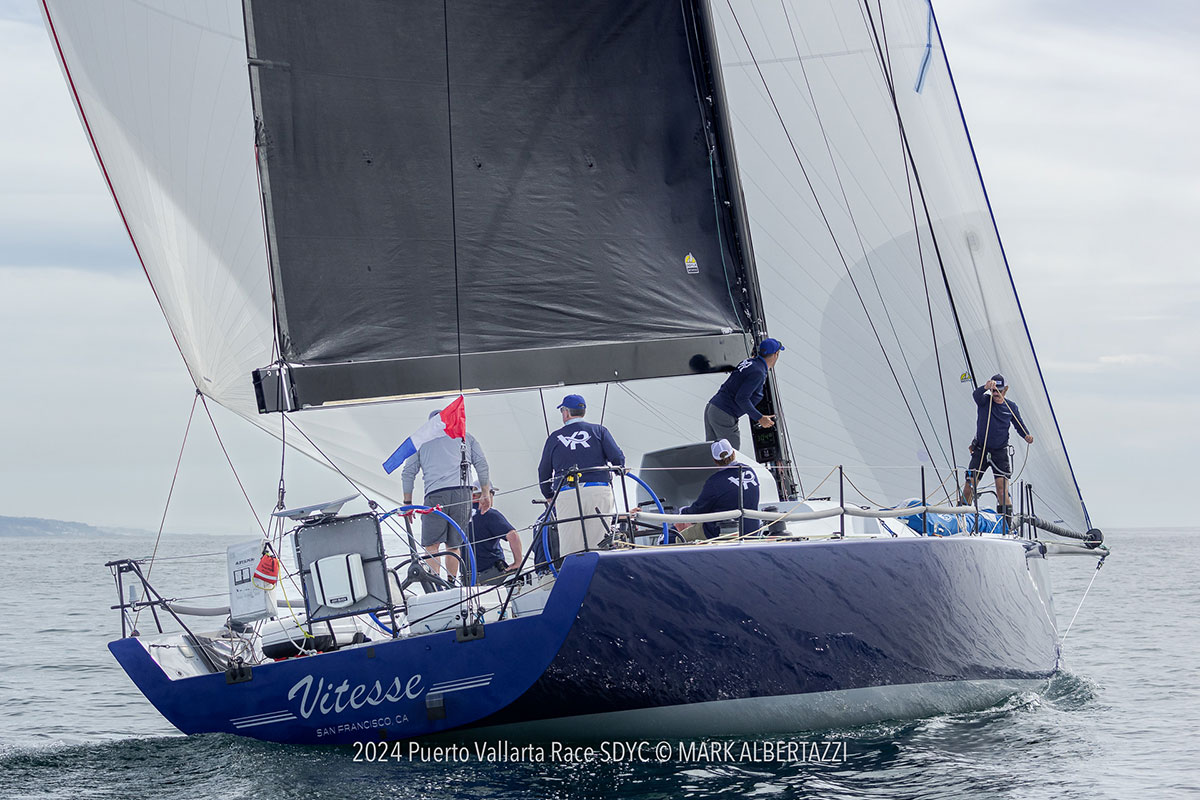
CLASS 3 || Vitesse, Thomas Furlong
The Fast 50 Class ended up with two of the top 3 overall boats in this regatta with Vitesse winning the Class and 2nd overall followed by Ivan Batanov's RP 51 Zero Gravity 51 correcting out an hour behind Vitesse for 2nd in class and 3rd overall. Thomas Furlong was sailing in his first Puerto Vallarta Race with the RP 52 Vitesse.
Thomas Furlong, Vitesse: “Us Saturday starters had a very challenging start. We actually did a really great start, by getting out of the harbor first, passing the Coronados first, and then we all kind of parked up again. It was that kind of race all the way down. Everytime we kind of felt like we were getting going and stretching out, we would collect back up and had several days where [our competitors] were literally stacked up a few miles away.
We had some beautiful sailing conditions, 10 knots of breeze with flat water, it’s pretty nice sailing. The full moon was great, and two nights ago we had really nice sailing [with boat speed] in the teens, a top speed about 20.
It’s really a hard tactical and strategic race. We had good crew work, the boat performed great. But trying to manage this year’s conditions was really challenging.”
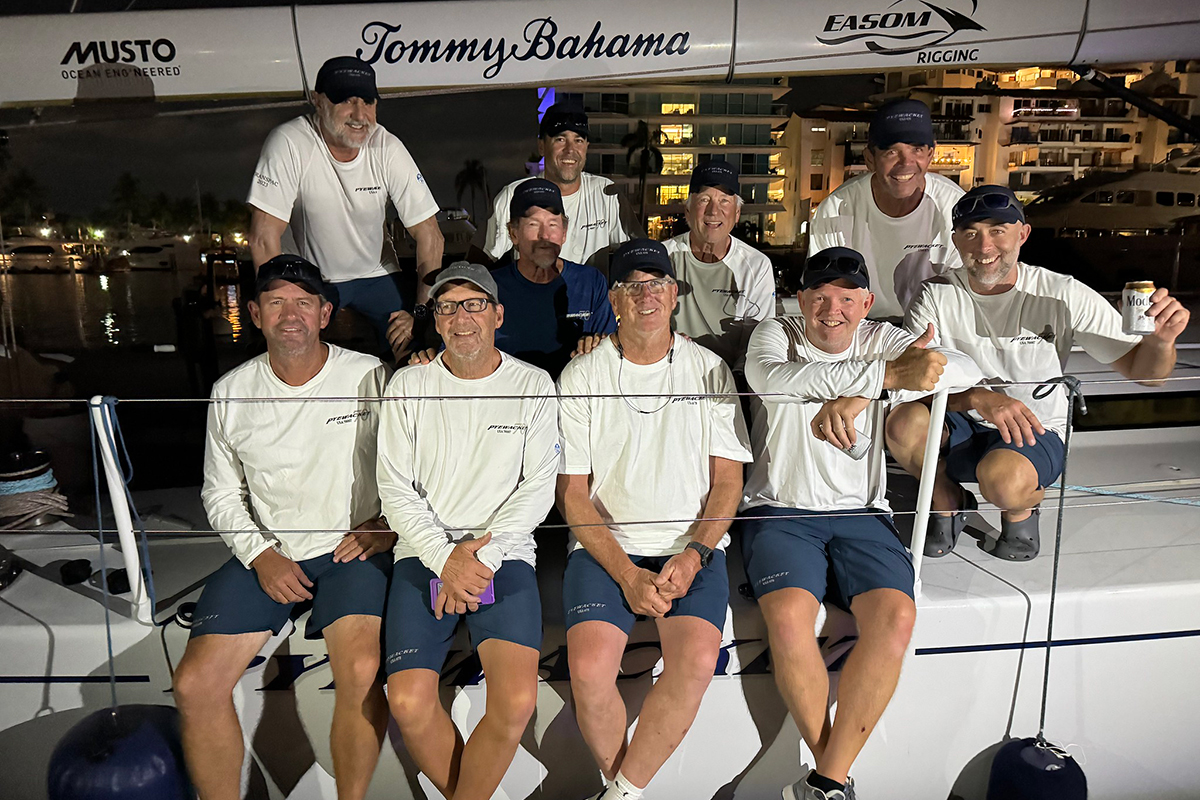
CLASS 2 || Pyewacket, Roy P. Disney
Pyewacket sailed the least number of miles to complete the course (1092 nm, 25 miles fewer than the race average). In fact, it's the same number of miles sailed by the same Andrews 68 Pyewacket in 2018, the last time Roy P. Disney won this race. Disney is now a record 4-time PV Race Overall winner (1992, 1998, 2018, and 2024).
Roy Disney: “PV 1992 was our first race on our new Santa Cruz 70, where we finished in front of the hotels, with a harrowing finish. We passed on both sides of the bay multiple times [to reach the finish]. In ‘98 we sailed a brand new RP 75 which was a great fast boat. And for all of these wins our common crew have been Ben Mitchell, Gary Weisman, Scott Easom and Robbie Haines.
This is a challenging course especially rounding Cabo which can be impossible at times, with hundreds of choices. It seems only one or two boats get it right each time. This year was hard because we had two weather models completely different up to the morning of the start then no clear resolution of the weather after that. We should be back for the next race, we love PV.”
In 2022, the Pyewacket team set the course record on the Volvo 70, at 3:04:38:02. So what’s more satisfying, racing 3 days to set a course record without the corrected time success, or sailing 5 days and winning the corrected time race?
Disney added “Each is satisfying and rewarding in its own way and for its own set of reasons. What I would say is a record means more time in PV!”
Cecil Rossi recently pivoted from sailing his Farr 57 Ho’okolohe racer cruiser to the long time hot rod Dencho/Kernan 68 Peligroso looking to speed up the racing and take on a new challenge. The Rossi team brought a highly experience and professional crew to the PV Race including Peligroso’s navigator for the last 5+ years Ernie Richau to add the specific boat experience to the program. The team didn’t miss a beat in Rossi’s first race on Peligroso ranking near the top of the overall standings throughout the week. They even brought along the BBQ from the other boat strapped to the backstay for fresh grilled meals which were a pleasant change of pace for the pros used to less refined race provisions.
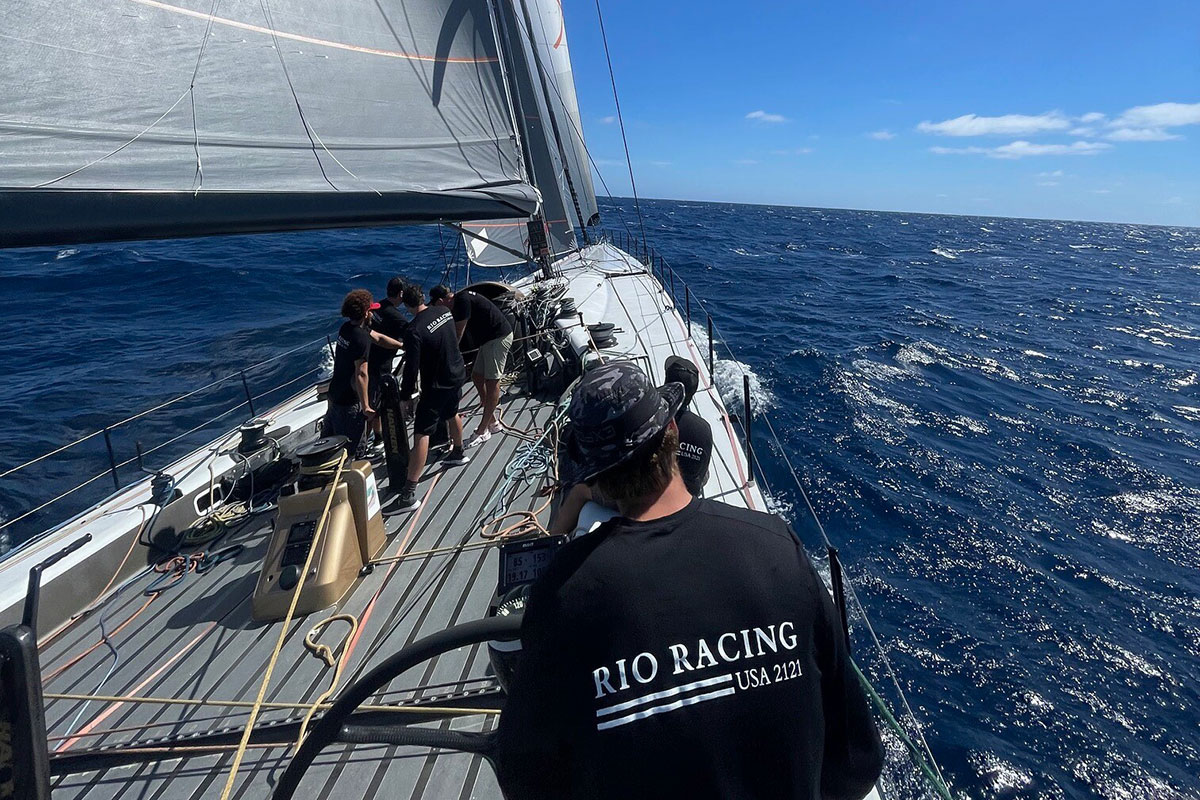
CLASS 1 || Rio100, Manouch Moshayedi
Rio100 doubled up in the 2024 PV Race as not only the first to finish (elapsed time winner) but also corrected time winner in Class 1. Pre-race weather predictions didn’t necessarily lend themselves to optimal conditions for the Rio machine, but the benefit of sailing the fastest boat in the fleet is when the conditions are right you can fly across the course and limit the amount of time where you can get stuck since you owe so much time to all the other boats. With Rio finished Wednesday morning and initial predictions for solid Wednesday night conditions for the rest of the fleet, BadPak and GoodEnergy appeared to be set to eat up the owed time from Rio. But the wind didn’t cooperate, and time ran out as the Class 1 competitors couldn’t get to the line in time to beat Rio.
Manouch Moshayedi: “The first night we sat for about 4 hours with zero wind, zero, zero, zero. Fortunately the last day, the last 24 hours helped us out and it was quite windy, 22-24 knots of wind and our top speed was over 27 knots.
Running an international race comes with its unique challenges. San Diego Yacht Club benefits from gracious hosts in Marina Vallarta courtesy of Harbormaster Pablo Fernandez, the Mexican Navy for allowing deep keel boats to tie up to their harbor wall to allow the Rio’s and GoodEnergy’s of the sport to participate with confidence in a welcoming place to land upon arrival. And over two decades of dockside customs and international entry processing management from friend of SDYC Juan Arias.
The heart of the regatta stems from the support of San Diego Yacht Club and it's members, particularly Karen Busch and Ben Mitchell who have been co-regatta chairs for nearly a decade, who set the standard for how the biennial offshore event is run from inception through the closing awards party race after race. SDYC will be back with the next edition of the Puerto Vallarta Race in winter 2026.


